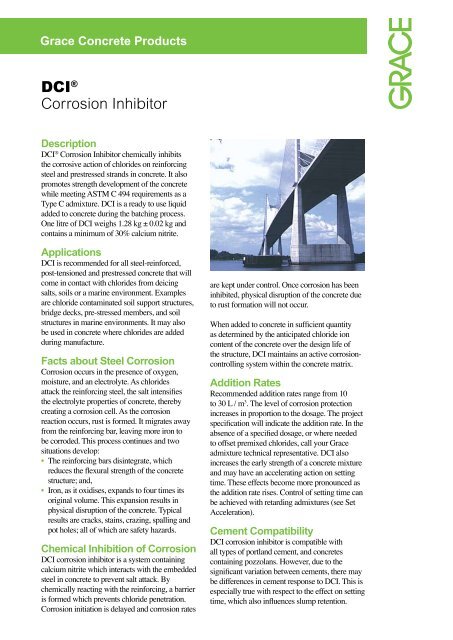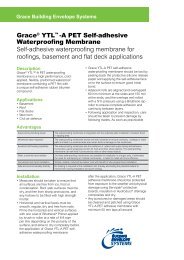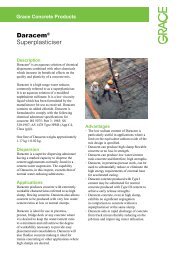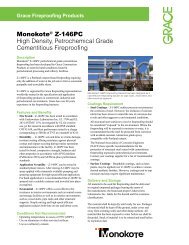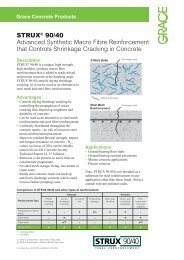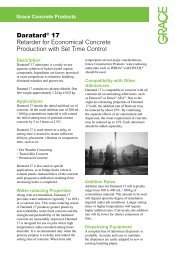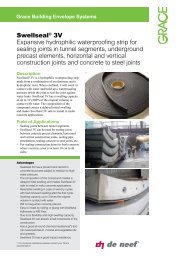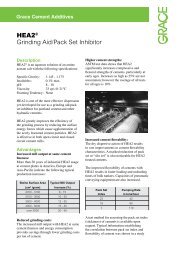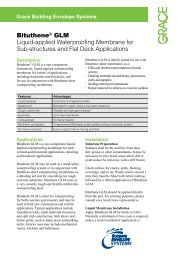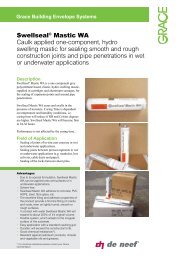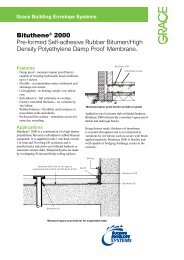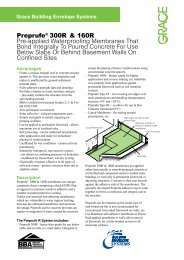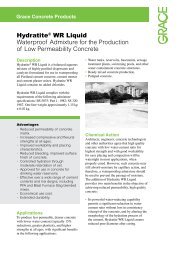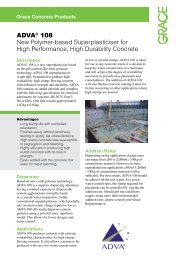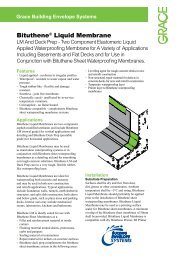DCI® Corrosion Inhibitor - W.R. Grace - Grace Construction Products
DCI® Corrosion Inhibitor - W.R. Grace - Grace Construction Products
DCI® Corrosion Inhibitor - W.R. Grace - Grace Construction Products
You also want an ePaper? Increase the reach of your titles
YUMPU automatically turns print PDFs into web optimized ePapers that Google loves.
<strong>Grace</strong> Concrete <strong>Products</strong><br />
DCI ®<br />
<strong>Corrosion</strong> <strong>Inhibitor</strong><br />
Description<br />
DCI ® <strong>Corrosion</strong> <strong>Inhibitor</strong> chemically inhibits<br />
the corrosive action of chlorides on reinforcing<br />
steel and prestressed strands in concrete. It also<br />
promotes strength development of the concrete<br />
while meeting ASTM C 494 requirements as a<br />
Type C admixture. DCI is a ready to use liquid<br />
added to concrete during the batching process.<br />
One litre of DCI weighs 1.28 kg ± 0.02 kg and<br />
contains a minimum of 30% calcium nitrite.<br />
Applications<br />
DCI is recommended for all steel-reinforced,<br />
post-tensioned and prestressed concrete that will<br />
come in contact with chlorides from deicing<br />
salts, soils or a marine environment. Examples<br />
are chloride contaminated soil support structures,<br />
bridge decks, pre-stressed members, and soil<br />
structures in marine environments. It may also<br />
be used in concrete where chlorides are added<br />
during manufacture.<br />
Facts about Steel <strong>Corrosion</strong><br />
<strong>Corrosion</strong> occurs in the presence of oxygen,<br />
moisture, and an electrolyte. As chlorides<br />
attack the reinforcing steel, the salt intensifies<br />
the electrolyte properties of concrete, thereby<br />
creating a corrosion cell. As the corrosion<br />
reaction occurs, rust is formed. It migrates away<br />
from the reinforcing bar, leaving more iron to<br />
be corroded. This process continues and two<br />
situations develop:<br />
• The reinforcing bars disintegrate, which<br />
reduces the flexural strength of the concrete<br />
structure; and,<br />
• Iron, as it oxidises, expands to four times its<br />
original volume. This expansion results in<br />
physical disruption of the concrete. Typical<br />
results are cracks, stains, crazing, spalling and<br />
pot holes; all of which are safety hazards.<br />
Chemical Inhibition of <strong>Corrosion</strong><br />
DCI corrosion inhibitor is a system containing<br />
calcium nitrite which interacts with the embedded<br />
steel in concrete to prevent salt attack. By<br />
chemically reacting with the reinforcing, a barrier<br />
is formed which prevents chloride penetration.<br />
<strong>Corrosion</strong> initiation is delayed and corrosion rates<br />
are kept under control. Once corrosion has been<br />
inhibited, physical disruption of the concrete due<br />
to rust formation will not occur.<br />
When added to concrete in sufficient quantity<br />
as determined by the anticipated chloride ion<br />
content of the concrete over the design life of<br />
the structure, DCI maintains an active corrosioncontrolling<br />
system within the concrete matrix.<br />
Addition Rates<br />
Recommended addition rates range from 10<br />
to 30 L / m 3 . The level of corrosion protection<br />
increases in proportion to the dosage. The project<br />
specification will indicate the addition rate. In the<br />
absence of a specified dosage, or where needed<br />
to offset premixed chlorides, call your <strong>Grace</strong><br />
admixture technical representative. DCI also<br />
increases the early strength of a concrete mixture<br />
and may have an accelerating action on setting<br />
time. These effects become more pronounced as<br />
the addition rate rises. Control of setting time can<br />
be achieved with retarding admixtures (see Set<br />
Acceleration).<br />
Cement Compatibility<br />
DCI corrosion inhibitor is compatible with<br />
all types of portland cement, and concretes<br />
containing pozzolans. However, due to the<br />
significant variation between cements, there may<br />
be differences in cement response to DCI. This is<br />
especially true with respect to the effect on setting<br />
time, which also influences slump retention.
Mix Water Reduction<br />
Mix water adjustment is essential to account for<br />
the water in DCI and thus maintain the desired<br />
water/cement ratio. The mix water added at<br />
the batch plant must therefore be reduced to<br />
compensate for the addition of the corrosion<br />
inhibitor. The adjustment factor is 0.84 kg of<br />
water per Litre of DCI. A high-range water<br />
reducer such as Daracem ® 100 or Daracem 19<br />
may be used to maintain workability in low<br />
water/cement ratio concrete<br />
Compatibility with Other<br />
Admixtures<br />
DCI corrosion inhibitor can be used in concrete<br />
with other admixtures – including air entraining<br />
admixtures, water reducers, superplasticisers, set<br />
retarders, pozzolans and microsilica – without<br />
impeding their performance. Each admixture<br />
must be added separately. Individually added,<br />
each will deliver exactly the results desired.<br />
Set Acceleration<br />
At all recommended addition rates, DCI corrosion<br />
inhibitor may accelerate concrete setting times,<br />
which may also aggravate slump loss. To extend<br />
the set time to a more normal duration, you can<br />
use the set neutralising DCI S or separately add a<br />
retarder such as Daratard ® 17 or Daratard HC. In<br />
most cases, adjusting the dose of superplasticiser<br />
will be sufficient. The full accelerating action of<br />
DCI may actually be desirable during the cool<br />
months of the year.<br />
Air Entrainment<br />
DCI corrosion inhibitor at the normal addition<br />
rates may moderately reduce the entrained<br />
air content. It may be necessary to increase<br />
the dosage of the air- entraining admixture to<br />
compensate. Project specifications for DCI<br />
generally will show requirements of 7½± 1½ %<br />
in the plastic or fresh concrete.<br />
www.graceconstruction.com<br />
Australia: Adelaide (61-8) 8261 8622, Brisbane (61-7) 3277 7244, Melbourne (61-3) 9359 2121,<br />
Perth (61-8) 9353 3433, Sydney (61-2) 9743 8811<br />
Hong Kong (852) 2675 7898 Indonesia (62-21) 893 4260 Japan (81-3) 5405 2991 Korea (82-32) 820 0800<br />
China Mainland: Beijing (86-10) 6786 3488, Guangzhou (86-20) 3833 0775, Shanghai (86-21) 5467 4678<br />
Malaysia (60-3) 9074 6133 New Zealand: Auckland (64-9) 448 11146320, Christchurch (64-3) 327 2173,<br />
Wellington (64-4) 238 2048 Philippines (63-49) 5497 373 Singapore (65) 6265 3033 Taiwan (886-3) 461 5462<br />
Thailand (66-2) 709 4470 Vietnam: Ho Chi Minh City (84-8) 7106 168<br />
DCI, Daracem and Daratard are registered trademarks of W R <strong>Grace</strong> & Co.-Conn.<br />
Preconstruction Trial Mix<br />
It is strongly recommended that trial mixes be<br />
made several weeks before construction start<br />
up. This will allow the concrete producer an<br />
opportunity to determine the proper batching<br />
sequence and amounts of other admixtures<br />
needed in order to deliver the required concrete<br />
mix to the job-site. Due to the cement response<br />
variation and the strong acceleration potential of<br />
DCI, it is vital that set time and slump retention<br />
of the proposed mix be thoroughly tested and<br />
evaluated in the light of job requirements. <strong>Grace</strong>’s<br />
broad experience with this product can help the<br />
concrete producer deliver satisfactory product<br />
regardless of the mixture proportions. Contact<br />
your <strong>Grace</strong> admixture sales representative for<br />
help with trial mixes.<br />
Finishing and Curing<br />
Concrete containing DCI corrosion inhibitor<br />
finishes with standard tools and techniques. It is no<br />
different from any other air- entrained, low water/<br />
cement ratio mix in terms of finishability. Curing<br />
procedures must follow ACI 302 and ACI 308.<br />
Packaging and Availability<br />
DCI corrosion inhibitor is available in bulk<br />
quantities by <strong>Grace</strong> <strong>Construction</strong> <strong>Products</strong><br />
metered systems, or in 208L drums.<br />
Dispensing Equipment<br />
A complete line of admixture dispensers is<br />
available. Accurate and easy to maintain, the<br />
dispensers are easily adapted to new or existing<br />
batching plants.<br />
Freezing Point<br />
DCI freezes at approximately<br />
-15°C, but its corrosion inhibition and strength<br />
gain properties are completely restored by<br />
thawing and thorough agitation.<br />
Health and Safety<br />
See DCI Material Safety Data Sheet or consult<br />
<strong>Grace</strong> <strong>Construction</strong> <strong>Products</strong>.<br />
The information given is based on data and knowledge considered to be true and accurate and is offered for the user’s consideration,<br />
investigation and verification. Since the conditions of use are beyond our control we do not warrant the results to be obtained. Please<br />
read all statements, recommendations or suggestions in conjunction with our conditions of sale including those limiting warranties and<br />
remedies which apply to all goods supplied by us. No statement, recommendation or suggestion is intended for any use which would<br />
violate or infringe statutory obligations or any rights belonging to a third party.<br />
These products may be covered by patents or patents pending. Copyright 2008. W. R. <strong>Grace</strong> (S) Pte Ltd 18-DCI-1D Printed in Singapore 03/08


